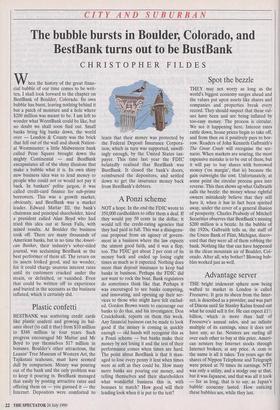A Ponzi scheme
NOT a hope. In the end the FDIC wrote to 350,000 cardholders to offer them a deal. If they would pay 50 cents in the dollar, it would tell the credit-rating agencies that they had paid in full. This was a disingenu- ous proposal from an agency of govern- ment in a business where the law expects the utmost good faith, and it was a flop, too. The FDIC got about 2 per cent of its money back and ended up losing eight times as much as it expected. Nothing does more than deposit insurance to keep bad banks in business. Perhaps the FDIC did not want to rock the boat. Bank regulators do sometimes think like that. Perhaps it was encouraged to see banks competing, and innovating, and opening up their ser- vices to those who might have felt exclud- ed. Gordon Brown wants to encourage our banks to do that, and his investigator, Don Cruickshank, reports on them this week. Any financial business can be made to look good if the money is coming in quickly enough — old hands will recognise this as a Ponzi scheme — but banks make their money by not losing it and the test of their performance comes when times are hard. The point about BestBank is that it man- aged to lose every penny it lent when times were as soft as they could be. How many more banks are pouring out money, and telling themselves and their shareholders what wonderful business this is, with bonuses to match? How good will their lending look when it is put to the test?


























































 Previous page
Previous page